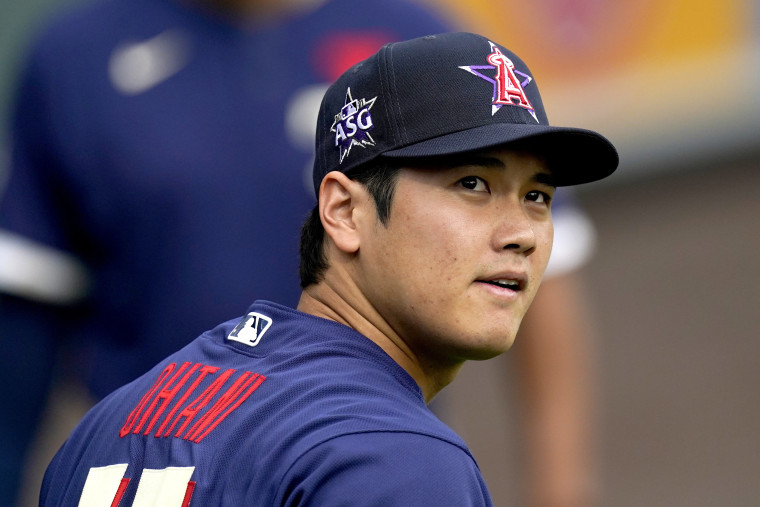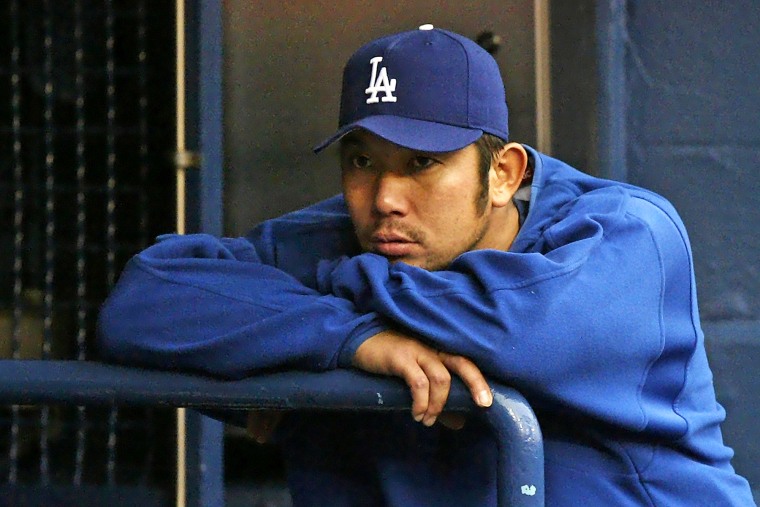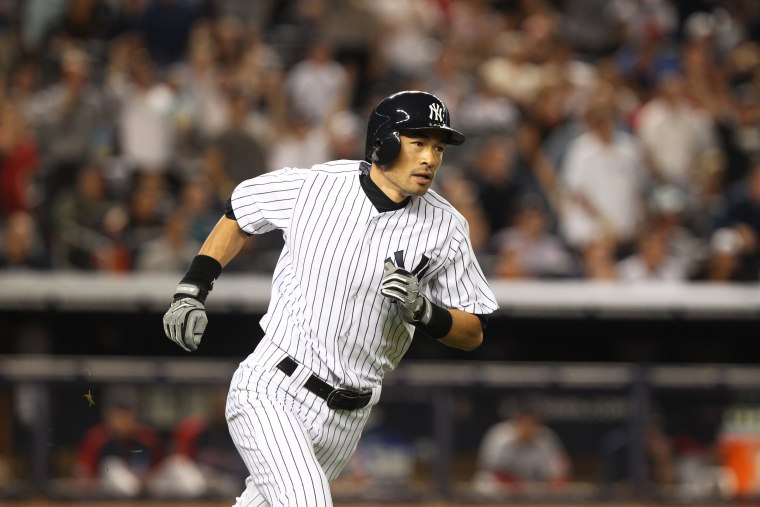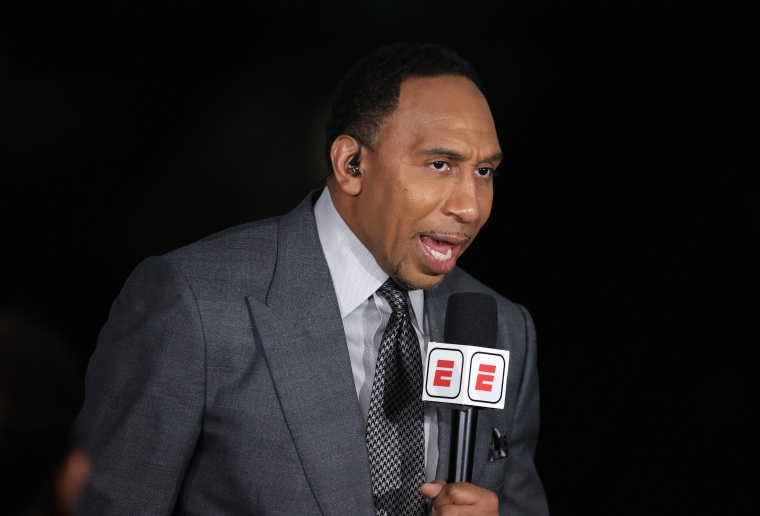As Asian Americans speak out against ESPN analyst Stephen A. Smith's claim that major-league baseball star Shohei Ohtani, who is Japanese, shouldn't be the face of the sport because he uses an interpreter, experts say such language reflects deeper, insidious beliefs about who gets to represent America's historical pastime.
Smith, who has apologized, came under fire Monday in a discussion about the waning popularity of baseball on the morning talk show "First Take." He said that while he understands that baseball is an international sport, "when you talk about an audience gravitating to the tube or to the ballpark ... I don't think it helps that the No. 1 face is a dude that needs an interpreter." A few hours later, he tried to clarify his comments by doubling down, saying he was "talking about the marketability and the promotion of the sport."

But experts say debates about marketability have often disguised racist ideas, particularly in the context of a sport that is considered so "traditionally American" and an undeniably skilled player who is Asian, a member of a race that has long been perceived as foreign.
"In regards to 'marketability,' it is one of the most absurd things I've ever heard," said Stan Thangaraj, the author of "Desi Hoop Dreams" and an associate professor of anthropology, gender studies and international studies at City College of New York. "What we have here with Stephen A. is a really miscalculated historical understanding of Asian players and Asian American players and their impact not only in Asia but in the U.S. and how beloved they are."
Ohtani, who plays for the Los Angeles Angels, has shown prowess in both pitching and batting that has secured his reputation as a once-in-a-lifetime athlete. With such a unique, elite-level skill set, Ohtani, 27, is poised to become what many sportscasters have referred to as the "next Babe Ruth." But experts point out that as rare as Ohtani is, his status as an international athlete in the major leagues isn't. Those from other countries, particularly in the Caribbean and Asia, have enjoyed a great deal of success, and they have done so with the use of translators.

Before Ohtani's major-league debut, several Japanese players impressed U.S. audiences, and they used interpreters to communicate with the media. Pitcher Hideo Nomo, best known for his time with the Los Angeles Dodgers in the early 1990s, who is credited with opening the floodgates for Japanese players in the major leagues, sparked what was then referred to as "Nomomania," with kids across the country trying to emulate his signature windup. Others, like slugger Hideki Matsui, who secured a three-year, $21 million contract with the New York Yankees in his 2003 debut, had some of the game's top jersey sales in his first year.
One of the most universally beloved athletes in the game, Ichiro Suzuki, who retired as a Seattle Mariners icon in front of a sold-out crowd in Tokyo, had diehard fans throughout his 28-season career. And even though he knew English, he insisted on using an interpreter to communicate consistently with fans.
"All you have to do is just look up the name Ichiro Suzuki, who transferred from Japan breaking all kinds of records in Japan and then coming to play for the Seattle Mariners," Thangaraj said. "The box office exploded, and his gear was selling so quickly."

Because baseball is perceived as an American institution, the sport in some ways is a reflection of what people define as American, so how the media cast players is important, experts said. Smith's fixation on language reflects a belief that the "boundaries of belonging and citizenship" in the U.S. are negotiated through English proficiency, Thangaraj said.
"It allows us to really fall into the trope of belonging. That is now not only seen as physical and by phenotype, but also cultural," he said. "When we delve into language and the realms of the culture, it becomes a way to portray Asians as never American enough or impossible baseball players, not authentic baseball players."
Constancio Arnaldo Jr., an assistant professor of Asian and Asian American studies at the University of Nevada, Las Vegas, said the idea of the emasculation of Asian men contributes to the notion that Ohtani is insufficient as a representative of the sport. Ohtani's Asianness contests age-old ideas of what a dominant, powerful athlete looks like.
"It's about masculinity. ... Asian and Asian Americans are always seen as not masculine enough. Then you have a game that's seen as part of the embodiment of this white masculinity," Arnaldo said. Ohtani is "also challenging what is acceptable in terms of athletic performance, baseball skill, especially, that are speaking back to these longer legacies of baseball as being this American white pastime."
Christina Chin, an associate professor of sociology at California State University, Fullerton, said that for as long as Japanese players have been in the major leagues, the media have focused on their training, consistency, background and precision.
"We don't talk about them in the same way in terms of them as being power hitters, as being hypermasculine. We don't talk about them in terms of strength and power," Chin said. "Ohtani is really changing that narrative."
Arnaldo said baseball has long been steeped in white supremacist ideas of Americanness. For years, the sport was segregated in the U.S., with the owners of the professional National League instituting a "gentleman's agreement" in 1876 to bar Black players. Black players were relegated to their own traveling teams until a separate Negro League was established in 1920. Jackie Robinson broke the color barrier with his integration into the whites-only major leagues in 1947 with the Brooklyn Dodgers.
"I think that we also have to take into account that longer legacy of how major-league baseball was not meant for people of color to play," he said.
Thangaraj said that even comparisons of Ohtani to Babe Ruth reflect a standard of whiteness in the sport.
"We're not gauging Ohtani as that once-in-a-lifetime talent but rather gauging him through the whiteness of Babe Ruth, where we re-insert whiteness as the dominant way of understanding baseball," he said. "Babe Ruth is then pulled in to normalize the whiteness of baseball and the normalized English and all these other things."
Chin agreed, adding that just as Japan has been portrayed as a threat to white American culture, particularly in entertainment, such ideas reverberate to this day through the way Ohtani is framed.
"We talk about Babe Ruth. We think about this legendary white success," Chin said. "Ohtani's presence is in many ways sort of a threat to what we think of as white exceptionalism. ... To have Ohtani, a Japanese player, coming to potentially threaten those records and to threaten those standings, I could see that other folks may perceive that to be a potential threat to what we think of as the old white American legacy in baseball."
Factoring a language requirement into Japanese players' perceived marketability gives the impression that only mainstream white audiences "count" as real baseball consumers. Thangaraj said it also makes Ohtani something of a scapegoat for decades of decline in baseball's popularity. In reality, Ohtani's stardom is, in all senses, an asset to the game, experts said.
And if nothing else, he can help widen the audience, bringing in more Asian and Asian American fans. Chin said that in her research, young Japanese basketball players often cited Japanese major-league baseball stars as their inspirations, underscoring their reach and the importance of diversity.
"This is not even a sport that they necessarily play themselves, because they were basketball players, but they would talk about Ichiro or they would talk about Hideki. They would talk about Japanese baseball players as being their role models. It's important to have that representation," Chin said.
Ultimately, no language is necessary to understand the legendary status Ohtani is poised to achieve.
"Speaking English does not constitute one's performance of Americanness. In many ways, he's performing an American national pastime, even though he's not American," Arnaldo said. "He doesn't need a translator to convey his thoughts or his ideas. He's doing it through his play, through his body, the fact that he's being a dominant force in major-league baseball."
